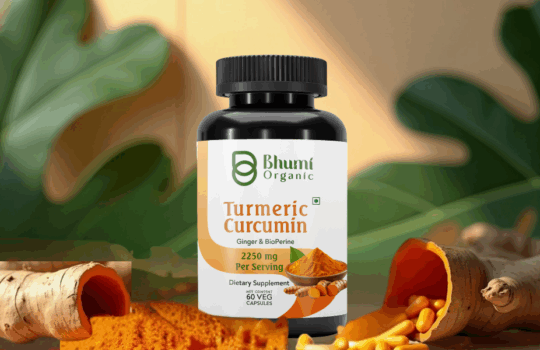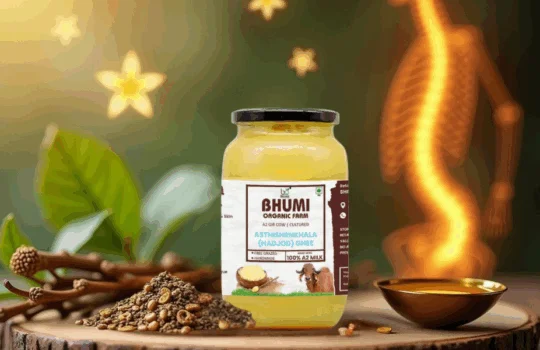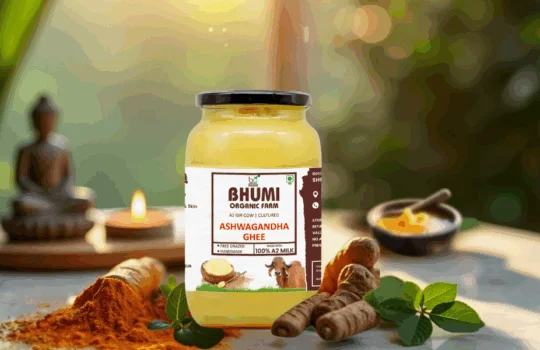Organic cow ghee is a clarified butter that has been used for centuries in traditional Ayurvedic practices and various culinary traditions. While specific scientific studies on the impact of organic cow ghee on bone and muscle function are limited, ghee does contain certain nutrients that can contribute to overall bone and muscle health. Here are some potential ways in which organic cow ghee might be beneficial:
- Vitamin K2 content:
- Bone Health: Organic cow ghee contains vitamin K2, which is associated with bone metabolism. Vitamin K2 helps in the regulation of calcium, directing it to the bones and teeth and contributing to bone mineralization.
- Fatty Acids:
- Omega-3 Fatty Acids: While the levels are relatively low, organic cow ghee contains omega-3 fatty acids, which are known for their anti-inflammatory properties. Chronic inflammation can negatively impact bone health.
- Conjugated Linoleic Acid (CLA):
- Muscle Health: Ghee, particularly from grass-fed cows, may contain small amounts of conjugated linoleic acid (CLA). CLA has been studied for its potential role in promoting muscle growth and reducing body fat.
- Rich in fat-soluble vitamins:
- Vitamins A, D, and E: Ghee is rich in fat-soluble vitamins, including vitamins A, D, and E. These vitamins are essential for overall health, and vitamin D, in particular, is crucial for calcium absorption and bone health.
- Lubrication for Joints:
- Ayurvedic Perspective: In Ayurveda, ghee is considered to have a lubricating and nourishing effect on the joints. This may contribute to joint flexibility and overall musculoskeletal well-being.
Ways to Use Organic Cow Ghee:
- Cooking and sautéing:
- Use organic cow ghee as a cooking fat for sautéing vegetables, preparing curries, or frying. It adds a rich flavor to dishes.
- Bulletproof Coffee:
- Blend a small amount of organic cow ghee into your coffee along with MCT oil for a creamy and energy-boosting beverage.
- Drizzling over Vegetables:
- Drizzle melted ghee over steamed vegetables or roasted dishes to enhance flavor and nutritional content.
- Golden Milk:
- Mix organic cow ghee into warm milk with turmeric, black pepper, and other spices to make golden milk, which is known for its potential health benefits.
- In Baking:
- Substitute organic cow ghee for other fats like butter or oils in baking recipes for a unique flavor.
Important Considerations:
- Moderation:
- While ghee can be a part of a healthy diet, it should be consumed in moderation due to its calorie and fat content.
- Quality Matters:
- Choose high-quality, organic cow ghee from grass-fed cows to ensure better nutritional content.
- Individual Variability:
- Responses to dietary choices can vary among individuals. What works for one person may not work the same way for another.
- Consultation with Healthcare Professionals:
- If you have specific health concerns or conditions, especially related to bone and muscle health, it’s advisable to consult with healthcare professionals for personalized advice.
While organic cow ghee can be a flavorful addition to your diet, it’s important to view it as part of a balanced and varied eating plan. It should not replace a diverse range of nutrient-rich foods, and individual dietary needs may vary. If you have specific health concerns or conditions, it’s always a good idea to seek guidance from healthcare professionals.
Related Articles
Recent Comments
Recent Posts
Tags
A2 milk Aged garlic Anti-inflammatory Ayurvedic medicine Bilona method Black garlic bread Black garlic chicken Black garlic extract Black garlic hummus Black garlic mayonnaise Black garlic oil Black garlic paste Black garlic powder Black garlic recipes Black garlic salt Black garlic seasoning Black garlic shrimp Black garlic steak Black garlic supplements Black garlic tofu Black garlic vinegar Butyric acid Conjugated linoleic acid (CLA) Cooking oil alternative Digestive health Fat-soluble vitamins Fermented garlic Gir cow Grass-fed cows Gut bacteria Health benefits Health benefits of black garlic Natural ghee Nutritious fat Omega-6 fatty acid Organic ghee Pure butterfat Pure ghee Rich flavour Roasted garlic Spread alternative Sweet garlic Traditional churning method Traditional Indian ghee Umami flavour




